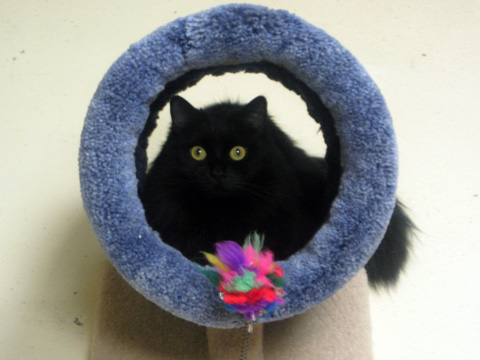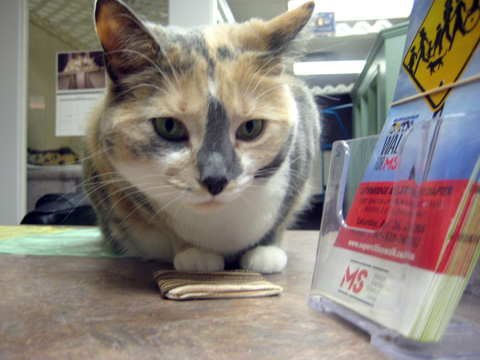Are You Ready For A Pet?

Picture this...you are at a local pet store and you see a cute, fluffy grey kitten reaching through the bars of its kennel. Or maybe it's a little puppy who looks so lost and lonely, the last of its litter. You only stop for a moment and then you find yourself pushing a shopping cart full of pet supplies for your new companion. Impulse shopping can happen to the best of us.
Falling in love with a sweet animal is the easy part. Sharing your life and home with a companion animal can be one of life's most wonderful and gratifying joys. Dogs and cats provide us with constant companionship and give us unconditional love and acceptance. Our pets don't judge, they look to us for love and guidance, always wanting to please. What better way to end a stressful day at work than with your dog or cat meeting you at the door giving you a look that you are the only thing that matters to them. It can be quite humbling.
But adding a dog or cat to your family is a big decision, one that should not be taken lightly and one that should not be done on impulse. Dogs and cats require a large commitment of time and money - often over 15 years' worth (for dogs) and longer for cats. Animal guardianship (we don't like the word 'owner') can be so very rewarding. But it is only rewarding if you think through your decision before you adopt a companion animal.
The very fact that you're looking at a website that helps homeless cats find adoptive homes means you're a caring person. Before you make that decision to bring a new pet friend into your home, please take some time to think over the following questions:
Why do you want a pet?
It's quite surprising how many people fail to ask this of themselves before they adopt a pet.
- Adopting a pet just because the kids have been begging for a dog or cat could end up being a big mistake.
- Don't think that you have to adopt because "we are a family, we are supposed to have a pet".
- Don't forget that in many cases a dog or cat may be with you 10, 15, or 20 years. Yes, even 20 years!
Do you have time for a pet?
- Dogs and cats cannot be ignored just because you're tired or busy.
- They require food, water, exercise, care, and companionship every day of every year.
- Many animals end up at shelters because their owners didn't realize how much time it took to care for them.
- And the idea that a cat is independent and can fend for itself is MISINFORMED!
- Cats need and require care, love and companionship just like dogs. They just usually need it in a different way!

Can you afford a pet?
- The costs of pet ownership can be high.
- Can you afford the veterinary care? You will need to have access to emergency pet care funds.
- Can you afford good food? It’s the best way to ensure a longer, healthy life.
- Licenses, microchips, i.d. collars, obedience classes, spaying and neutering, routine veterinary care, grooming, toys, food, kitty litter, and other items add up quickly.
- If you are “adopting” a cat from a rescue organization like PAW, spaying/neutering and first vaccinations are included in the adoption fee which is usually very reasonable. Some pet stores “sell” kittens and puppies. Be sure to ask what you are getting for the purchase price if you are “buying” a puppy or kitten from a pet store as it usually does not cover spaying and neutering.
- If you get a “free” kitten or puppy from a private source, you will be paying for your own veterinary costs (which can be surprisingly high). You may want to price out spay/neuter and other routine vet care before you get a new pet.
Are you prepared to deal with any problems that an animal may cause?
- Fleas (for outside pets), scratched-up furniture, accidents from dogs that aren't yet housetrained, stress-related litter box issues and unexpected medical emergencies are unfortunate but common aspects of pet ownership. All the aforementioned, however, can be handled with patience, appropriate pre-planning, the right training and proper accessories (e.g. a scratching post and a clean litter box for a cat!).
- Puppies and kittens especially have a way of getting into things when you least expect it.
- An after-hours trip to an emergency vet clinic will set you back $100 or more, just for walking in the door!
Can you have a pet where you live?
- Many people who rent an apartment or house are not allowed to have pets. If they do (and it's usually just cats and small dogs), there are sometimes restrictions associated with the permission to have a pet.
- Make sure you know what your rental manager requires before you bring a companion animal home.
- It may be a pet deposit that can range between $200 and $600 per pet (sometimes non-refundable). Trying to sneak in a pet is not a good idea and could lead to future trouble, including eviction. And then what happens to your pet? Pets are the ones that pay the ultimate price for their human’s mistakes.
Is it a good time for you to adopt a pet?
- If you have kids under five years old you might consider waiting before you adopt a companion animal. After all, animals, in many ways, are like children -- they get into things! Puppies and kittens need a lot of your time.
- If your kids are ready, make sure they know how to handle an animal. It's often difficult for a young child to understand that they can’t squeeze the cat or dog. Kittens and puppies are especially vulnerable around little children. An adult cat or dog can be a better choice. Children must be supervised as the pets get to know them.
- If you are a college or university student, in the military, or if your work has you traveling frequently, you may want to wait until your life stabilizes before you get a pet. Think about what is fair to the pet.
- Do you have a lot of stress in your life? New job? New baby? New marriage? Divorce? It may not be the best time to adopt. Maybe it's best to wait until life is not as stressful.
- The last thing you want to do is to have to give up your pet because of your lifestyle.

Are your living arrangements suitable for the animal you have in mind?
- The size and type of animal is not the only thing to think about.
- People often think that small dogs are ideally suited for an apartment, but some small dogs, such as terriers, are very active -they require quite a bit of exercise to be calm.
- Many small dogs also tend to bark at any noise. Some cat breeds can be quite vocal. Lonely pets will often vocalize.
- On the other hand, some big dogs and mature cats can be quite laid back and content to be a resident couch potato until you get home.
- Before you adopt a pet - do your research.
- Find a pet that is right for your lifestyle, family, home, etc. By doing your research, you will ensure that you will choose a pet who will fit into your life.
Who will care for your pet while you're away on vacation?
- This can be difficult; don't assume that your family will automatically take on this task. Many times it's just too much to ask.
- The ideal situation is to hire a pet-sitter. They come to your home and take care of your pets. Your pets will probably be less stressed out by having someone come to them, versus taking them somewhere foreign. A few pet sitters will actually live at your home making your pet feel like nothing much has changed. And the added benefit is that your house will have that lived-in look. If you have trusted friends or neighbours, that could be ideal. Maybe you can swap taking care of each other’s pets while you are away.
- You may need to get a good recommendation for a boarding kennel for a dog. Ask your friends what they do and what experiences they have had with leaving their pets. Cats do best in their own home but whoever comes in to take care of them must have time to stay for awhile. All pets will get lonely when you are away.
Will you be a responsible pet owner?
- Having your pet spayed or neutered does more than just prevent animals from being born that are not wanted. It also makes your pet healthier, calmer and often more obedient.
- Please remember to obey community leash and licensing laws.
- Keep a collar and identification tags on your pet at all times. Pets without ID tags are rarely reunited with their owners if they are lost. Use break-away collars for cats to prevent strangulation.
- Cats do best if kept strictly indoors. Cities are often hostile places for cats. Trapping cats is usually legal, if not out-and-out encouraged by city regulations. Rural areas including acreages have a high death rate for outdoor cats due to predators.
- Of course, being responsible also means giving your pet love, exercise, a healthy diet, and regular veterinary care to ensure that it lives a long and happy life.
Are you prepared to keep and care for the pet for his or her entire lifetime?
- When you adopt a pet, you are making a commitment to care for the animal for his or her lifetime. This can range from a few years to 20 years or more. Cats and some dogs have been known to live into their 20's and you need to ensure that you can care for this animal for his or her whole life. If you are an older person, be sure to have a contingency plan for your pets in case something unexpected happens.

Adopt a Pet for Life
Yes, it is a long list of questions to ask yourself. But if you take one quick trip through the local city animal shelter, you will understand why answering them before you adopt is so important.
Some of the homeless animals at the city shelter are puppies and kittens. They are the tiny victims of irresponsible people who allowed their animals to breed and thought it would be easy to find homes for them or didn't bother to look for any. There are, however, more dogs and cats at the shelters who are out of that "cute" puppy or kitten stage. Most of these adult animals were turned in by people who didn't think through responsible animal guardianship before they got a pet.
Dogs between 6 months and 2 years are turned in to shelters all the time. Why? No training and no understanding on the guardian's part that an animal needs training to make it a well adjusted family member.
Far more cats are turned in to animal shelters than dogs. As a result, many more of them are destroyed due to lack of space. Sadly, some people think that moving or a change in their family circumstances are legitimate reasons to give up a pet. THEY ARE NOT! You must go the distance for your pet (just as you would a child) when your life changes.
Please, don't become a statistic. Think it through before you adopt a pet. Sharing your life with a companion animal can bring incredible joy, but only if you're willing to make the necessary commitments of love, time, money and responsibility---for the entire life of the pet.
